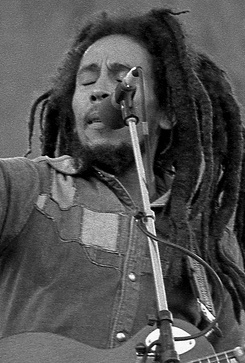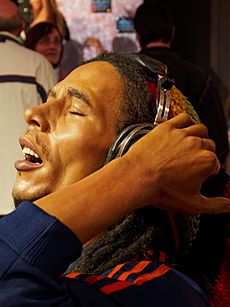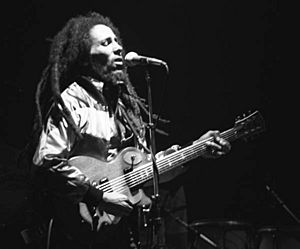Bob Marley facts for kids
Quick facts for kids
Bob Marley
OM
|
|
|---|---|

Marley performing in Dalymount Park in Dublin, July 1980
|
|
| Born |
Robert Nesta Marley
6 February 1945 Nine Mile, Saint Ann Parish, Colony of Jamaica
|
| Died | 11 May 1981 (aged 36) |
| Other names |
|
| Occupation |
|
| Spouse(s) | |
| Partner(s) | Cindy Breakspeare (1977–1978) |
| Children | 11, including: |
| Parents |
|
| Relatives |
|
| Musical career | |
| Genres | |
| Instruments |
|
| Years active | 1962–1980 |
| Labels |
|
| Associated acts | Bob Marley and the Wailers |
Robert Nesta Marley (born 6 February 1945 – died 11 May 1981) was a famous Jamaican singer, musician, and songwriter. He is known as one of the first artists to make reggae music popular around the world. His music blended reggae with other styles like ska and rocksteady.
Bob Marley's unique voice and songwriting helped make Jamaican music famous globally. He became a huge cultural icon. Marley was also a follower of Rastafari, a spiritual movement, and he put a lot of spiritual meaning into his songs. He is still seen as a symbol of Jamaican music and culture. He also spoke out for democratic social changes. In 1976, he survived a dangerous event at his home, which some believed was related to politics.
Marley started his music career in 1963 in Nine Mile, Jamaica. He formed a group called the Teenagers with Peter Tosh and Bunny Wailer. After a few name changes, they became the Wailers. Their first album, The Wailing Wailers, came out in 1965. It included the hit song "One Love", which became popular worldwide. This song helped the group become well-known in reggae music.
The Wailers released many more albums. They later signed with Island Records and became Bob Marley and the Wailers. Their music changed over time, becoming more focused on rhythm. This change happened around the same time Marley became a Rastafarian. He moved to London, and the band showed their new sound with the album The Best of The Wailers (1971).
The group gained international fame after signing with Island Records. They toured to support their albums Catch a Fire and Burnin' (both from 1973). The Wailers group broke up a year later, but Marley continued to perform under the band's name. His album Natty Dread (1974) was very well received.
In 1975, Marley became a global star outside Jamaica. This happened after Eric Clapton's version of Marley's song "I Shot the Sheriff" became popular. Marley then had his own international hit with a live version of "No Woman, No Cry" from the Live! album. His next album, Rastaman Vibration (1976), was a big success in the United States. It reached the Top 50 on the Billboard Soul Charts.
A few months after Rastaman Vibration was released, Marley survived a dangerous event at his home in Jamaica. This led him to move to London permanently. While in London, he recorded the album Exodus (1977). This album included elements of blues, soul, and British rock. It was a huge success with both fans and music critics.
In 1977, Marley was diagnosed with a type of skin cancer. He passed away from this illness in 1981. Before he died, he was baptized into the Ethiopian Orthodox Church. Fans all over the world were very sad about his death. He received a special state funeral in Jamaica.
The greatest hits album Legend was released in 1984. It became the best-selling reggae album ever. Marley is also one of the best-selling music artists of all time. He has sold more than 75 million records worldwide. After his death, Jamaica honored him with the Order of Merit. In 1994, he was added to the Rock and Roll Hall of Fame. Rolling Stone magazine ranked him No. 11 on its list of the 100 Greatest Artists of All Time. He also received a Grammy Lifetime Achievement Award, a star on the Hollywood Walk of Fame, and was inducted into the Black Music & Entertainment Walk of Fame.
Contents
Early Life and Music Start
Robert Nesta Marley was born on 6 February 1945. He was born on his mother's grandfather's farm in Nine Mile, Jamaica, in Saint Ann Parish, Jamaica. His parents were Norval Sinclair Marley and Cedella Malcolm. Norval Marley was from England and worked as a plantation overseer. Bob Marley's full name is Robert Nesta Marley. However, some stories say his birth name was Nesta Robert Marley. A passport official supposedly switched his names because Nesta sounded like a girl's name.
Bob Marley's father provided money but was often away. Bob attended Stepney Primary and Junior High School. When he was 10, his father passed away from a heart attack.
Bob Marley and Neville Livingston, who later became known as Bunny Wailer, were friends since childhood in Nine Mile. They started playing music together while at school. When Bob Marley was 12, he moved with his mother to Trenchtown, Kingston. Marley and Livingston lived together in Trenchtown. They began to explore new music styles like ska and the latest R&B from American radio stations.
Marley formed a singing group with Bunny Wailer and Peter Tosh. The group had different names, including the Teenagers and the Wailing Wailers. Eventually, they became simply the Wailers. Joe Higgs, a successful musician, lived nearby and encouraged Marley. At first, Marley and the others were only interested in singing harmonies. Higgs helped them improve their singing and taught Marley how to play the guitar.
Personal Life
Bob Marley married Alpharita Constantia "Rita" Anderson in Kingston, Jamaica, on 10 February 1966. Bob Marley had many children. He had four children with his wife Rita. He also adopted two children from Rita's previous relationships. In total, the official Bob Marley website lists 11 children.
His children listed on the official site are:
- Sharon, born 23 November 1964. She was Rita's daughter from a previous relationship, adopted by Marley.
- Cedella, born 23 August 1967, to Rita.
- David "Ziggy", born 17 October 1968, to Rita.
- Stephen, born 20 April 1972, to Rita.
- Robert "Robbie", born 16 May 1972, to Pat Williams.
- Rohan, born 19 May 1972, to Janet Hunt.
- Karen, born 1973, to Janet Bowen.
- Stephanie, born 17 August 1974. She was acknowledged as Marley's daughter.
- Julian, born 4 June 1975, to Lucy Pounder.
- Ky-Mani, born 26 February 1976, to Anita Belnavis.
- Damian, born 21 July 1978, to Cindy Breakspeare.
Marley also has three well-known grandchildren. They are musician Skip Marley, American football player Nico Marley, and model Selah Marley.
Love for Football
Besides music, association football (soccer) was very important in Bob Marley's life. He loved playing the game everywhere. He played in parking lots, fields, and even inside recording studios. Growing up, he was a fan of the Brazilian club Santos and its star player Pelé. He also supported the English football club, Tottenham Hotspur.
Marley often spent time with people from the sport. In the 1970s, he made the Jamaican international footballer Allan "Skill" Cole his tour manager. He once told a journalist, "If you want to get to know me, you will have to play football against me and the Wailers."
Illness and Passing
In July 1977, Bob Marley was diagnosed with a type of skin cancer. It was found under one of his toenails. This was not caused by a football injury, but was a sign of existing cancer. He had to see two doctors before a test confirmed the cancer. This type of cancer, called acral lentiginous melanoma, often appears in places that are hard to notice, like under nails.
Marley chose not to have his toe removed, which doctors suggested. He felt this would affect his ability to perform. Instead, the nail and nail bed were removed, and a skin graft was used to cover the area. Even with his illness, he continued to tour. He was planning a big world tour for 1980.
His album Uprising was released in May 1980. The band finished a large tour in Europe. They played their biggest concert to 100,000 people in Milan, Italy. After the tour, Marley went to the United States. He performed two shows in New York City as part of the Uprising Tour. He later collapsed while jogging in Central Park. At the hospital, doctors found that his cancer had spread to his brain, lungs, and liver.
Marley's very last concert was two days later. It took place in Pittsburgh, Pennsylvania, on 23 September 1980. Soon after, Marley's health got much worse as the cancer spread. The rest of his tour was canceled. Marley sought a different kind of treatment in Germany.
After eight months, the treatment did not stop the cancer. Marley boarded a plane to go home to Jamaica. During the flight, his health declined further. After landing in Miami, Florida, he was taken to a hospital. He passed away on 11 May 1981, at the age of 36. His final words to his son Ziggy were: “On your way up, take me up. On your way down, don't let me down."
Marley was given a state funeral in Jamaica on 21 May 1981. The funeral combined traditions from the Ethiopian Orthodox Church and Rastafari beliefs. He was buried in a chapel near his birthplace in Nine Mile. His casket contained his red Gibson Les Paul guitar and a Bible opened to Psalm 23.
On 21 May 1981, Jamaican Prime Minister Edward Seaga gave the final speech at Marley's funeral. He said:
His voice was an omnipresent cry in our electronic world. His sharp features, majestic looks, and prancing style a vivid etching on the landscape of our minds. Bob Marley was never seen. He was an experience which left an indelible imprint with each encounter. Such a man cannot be erased from the mind. He is part of the collective consciousness of the nation.
Legacy and Honours

Bob Marley received many awards and honors for his music and influence:
- 1976: Rolling Stone magazine named his band "Band of the Year".
- June 1978: He received the Peace Medal of the Third World from the United Nations.
- February 1981: He was given the Jamaican Order of Merit, which was the nation's third highest honor.
- March 1994: He was inducted into the Rock and Roll Hall of Fame.
- 1999: Time magazine named his album Exodus the "Album of the Century".
- February 2001: He received a star on the Hollywood Walk of Fame.
- February 2001: He was given a Grammy Lifetime Achievement Award.
- 2004: Rolling Stone ranked him No. 11 on their list of the "100 Greatest Artists of All Time".
- 2004: He was one of the first artists inducted into the UK Music Hall of Fame.
- His song "One Love" was named "Song of the Millennium" by the BBC.
- A BBC poll voted him one of the greatest lyricists of all time.
- 2006: A special plaque was put up at his first home in the UK, in London.
- 2010: His album Catch a Fire was added to the Grammy Hall of Fame.
- 2022: He was inducted into the Black Music & Entertainment Walk of Fame.
Discography
Studio Albums
- The Wailing Wailers (1965)
- Soul Rebels (1970)
- Soul Revolution Part II (1971)
- The Best of the Wailers (1971)
- Catch a Fire (1973)
- Burnin' (1973)
- Natty Dread (1974)
- Rastaman Vibration (1976)
- Exodus (1977)
- Kaya (1978)
- Survival (1979)
- Uprising (1980)
- Confrontation (1983)
Live Albums
- Live! (1975)
- Babylon by Bus (1978)
See also
 In Spanish: Bob Marley para niños
In Spanish: Bob Marley para niños
- Outline of Bob Marley
- List of peace activists
- Fabian Marley
- Desis bobmarleyi – an underwater spider species named in honor of Marley
 | John T. Biggers |
 | Thomas Blackshear |
 | Mark Bradford |
 | Beverly Buchanan |


